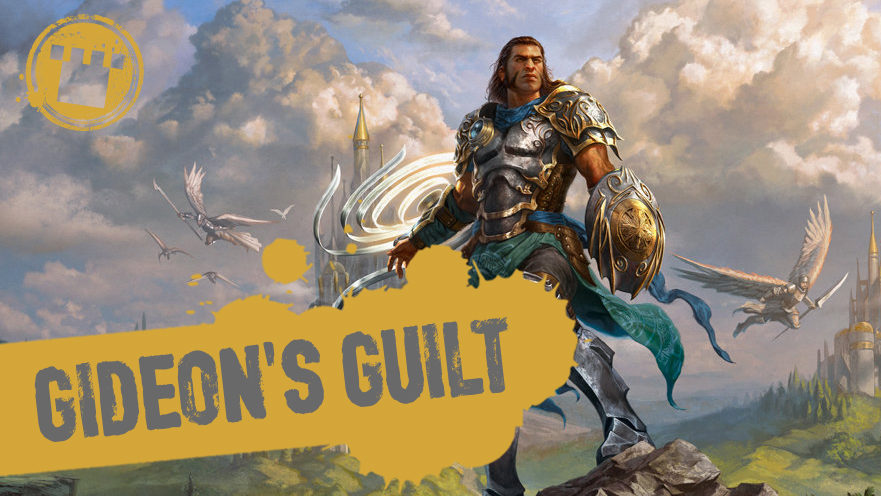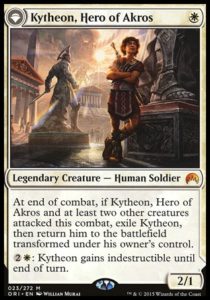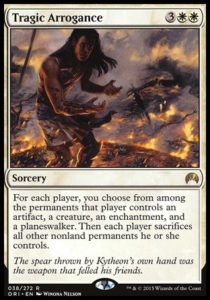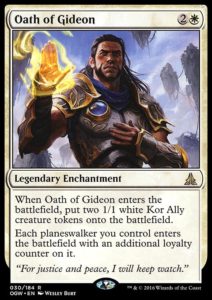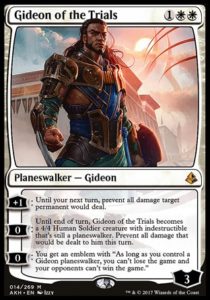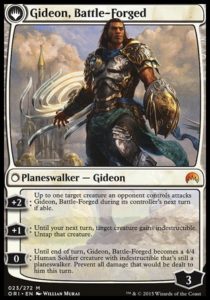Content Warning: This article contains references to child abuse, death, and suicide.
One of Magic’s most powerful qualities is its ability to encompass the entirety of human experience and philosophy within the color pie. While that includes the sweet taste of victory and passionate anger, it also contains the heartbreaking pain of trauma and loss. As a survivor of abuse, I’m well acquainted with the struggle of handling the memories of past physical and emotional violence – parsing through what happened, how it affected me, and what I can do now.
It’s this shared experience of dealing with trauma that allows me to empathize deeply with the straight-laced Gideon Jura – not necessarily the independent Liliana, introspective Nissa or inquisitive Jace. While each of these main characters have qualities that I admire and envy, it’s Gideon’s desire to do good by others that resonates with me best, much to my own surprise. After all, when you’ve been exposed to some of the worst the world can offer, it becomes that much harder to turn around and treat others with compassion. By examining Gideon’s journey to adulthood, we can see that it is possible to be kind while living with trauma.
Traumatic Events
Honestly, Gideon and I don’t have much in common in terms of early experience (or musculature). As a teenager on the streets of Akros, Kytheon (as he was known) became the head of one of the most notorious gangs in the city, the Irregulars – a group of boys who stole from the rich, took what they needed, and gave the rest to the poor. When he lands in prison, Hixus, the warden, gives him a chance to escape, but he turns down the opportunity to kill the man and flee. We can see the center of Gideon’s character through Hixus’s eyes.
“You are here, a thief, condemned for stealing. But what you stole was food, to help feed your friends and their families. You do what you think is right.” (“Gideon’s Origin: Kytheon Iora of Akros”, Magic Story, Ari Levitch)
In contrast, trying to do the right thing was a difficult thing to ascertain for me as a child and even as a teenager. While I wasn’t orphaned or thrown into prison for stealing, I was constantly told to do what was “right.” Not because it was necessarily morally correct, but because it pleased my parents and prevented them from harming me. That metric for “rightness” is a skewed one, because it relies so much on the approval of others rather than your own. So I grew up in a confused, fearful state, hoping that my actions would help me survive another day.
While my world gradually crumbled down, Gideon’s collapsed in one fell swoop. After learning hieromancy from Hixus for four years, he gathers his old friends and defends Akros from various threats – cyclopses, harpies, and a titan sent from the Death God Erebos. In a state of righteous hubris and moral certainty, Gideon hurls the spear loaned to him by the Sun God Heliod at Erebos, only to have the weapon reversed in his direction. Gideon tries to shield his friends, but fails. This shatters his world, and his spark ignites:
No damage, but he noticed flecks of red. He moved a hand to wipe them, and saw that the back of it was splattered red too—both hands were. But if it wasn’t his blood….
No.
He whirled around.
His eyes passed over four lifeless bodies.
No.
The ground heaved, and Kytheon struggled to keep his footing. He staggered among his fallen Irregulars, mouth agape. His thoughts turned to the spear, thrown by his own hand.” (“Gideon’s Origin: Kytheon Iora of Akros”, Magic Story, Ari Levitch)
This is the moment where Gideon’s inner world falls apart and the pillars of his belief disintegrate in the face of his despair. Why would the gods be so cruel? Why wasn’t he strong enough to save his friends? Who did he think he was, to defy something so much more powerful than him?
This deep sense of guilt is something I carry with me as well. I’ve asked myself so many times: Why couldn’t I have been stronger, more powerful? Why didn’t I fight back? Why didn’t I ask for help? Why couldn’t I protect the things I cared about? Is this all my fault?
For Gideon, me, and so many other survivors of trauma, the same verdict comes down from our inner judge:
I could’ve done more. I should have been better. I will not be worthy until I am the best.
When I realized that I was being abused, I resolved to be better than my family, to break off that trust, approval and longing for love that I had wanted all of my life. I could take the strength I had learned and the skills I had acquired to become a strong, invulnerable adult. I didn’t need them. I didn’t need anyone. All I needed was to be good, for my own sake.
And that’s what Gideon thought as well. He may not have had abusive parents, but the faith he had placed in his gods – avatars of belief in his world – had shattered. If you can’t rely on those who are supposed to protect you, you can only rely on yourself. Depending on others was a liability that his heart couldn’t take.
As you can imagine, that approach doesn’t lead to making the healthiest decisions.
Living With Trauma
Steeped in guilt, Gideon decided to stay solitary for a long time, almost to the point of self-destruction. After joining the Order of Heliud and going on a tumultuous adventure with Chandra, he becomes obsessed with trying to save the innocent by fighting concurrent wars on two planes: Zendikar and Ravnica. Over a five-day period, he visits these planes on eight-to-ten-hour shifts, trying to save the refugees of Zendikar from the Eldrazi and taking down gang members with the Boros, all without sleep. He barely attends to his wounds and never asks for help.
His shifted his gaze to Dars. “You followed me.”
“Clearly I had reason. You didn’t have to do this alone, Gideon. We fight as a legion because some things are bigger than us.”
“I had him, Dars.”
“We’ll find him. As a legion, we’ll find him. You have a rest.”
Not yet. (“Limits”, Magic Story, Ari Levitch)
For years, I never thought to ask for help, either. I thought I could handle my problems myself, to prove my own inner strength and resolve. Conversations about my family and childhood would gloss over my abuse and pain, because I never wanted to reveal my weaknesses. I never wanted to tell others, even my closest friends, that I had been abused and done almost nothing about it. That I hadn’t been clever or courageous enough to break free. It was a lonely existence until I was confronted with something I couldn’t deal with alone.
It isn’t until Gideon realizes he has a problem he can’t solve himself that he’s forced to seek outside help. When he realizes the leylines of Zendikar are beyond him, he finally reaches out to Jace. Doing so sets off a chain of events that culminate in a group of Planeswalkers coming together to save Zendikar from the Eldrazi Titans. Gideon proposes the formation of a group – The Gatewatch – to help combat interplanar threats, and they agree. For the first time in years, Gideon feels that he can be part of a team again; this time, a team of people just as powerful as he is. Being less vulnerable, he doesn’t have to be quite as concerned for his teammates. But he still sees himself as responsible for the well-being of the team as a whole, as Jace learns as he watches Emrakul torture Gideon on Innistrad. As Jace looks on, protected by his mental magic, he sees Erebos asking Gideon what he wants. If he dissembles even a bit, each of his friends dies.
“Gideon’s shoulders slumped, his sural retreated back into its sheath. He looked up at Erebos, his face a mixture of anger and despair. “I most desire…” he paused, drawing a deep breath, “I most desire to protect others, to save them…”
“You lie.” Erebos’s whip lashed out, and as it struck the Jace next to Gideon he disintegrated, his flesh dissolving upon its touch.
Gideon’s voice crackled with anger. “I want to defeat you, to tear you down so you can no longer…”
“No. You continue to speak lies…Must you lose everyone before you acknowledge truth, mortal? All your stubbornness to what end? You are determined to feel the most pain.” Erebos’s whip danced with its master’s touch. “What do you want?”
Gideon raised his head to the skies and screamed, “I want…” but before he finished his sentence the window went dark.” (“The Promised End”, Magic Story, Ken Troop)
In college, I was informed that my maternal grandfather had passed away. My initial impression from the news was fear. Fear that my mother, who had cared for him deeply, would somehow blame me for his death or shame me for not visiting him more often. There was also fear that she would take out her grief on me in violent ways, and I couldn’t fight back or leave without her cutting off my tuition. Overwhelmed and feeling helpless, I decided to drop into a free therapy session held by my school’s psychology department.
I sat down with a young man and a woman in their office, and was asked to talk about what was on my mind. Thinking through my terror, eyes downcast, I began to enumerate my fears out loud. Hearing myself made me feel ashamed and weak, as if finally admitting this made it real, not just a concept. I admitted that I wished I were stronger so I could handle all of this without fear. “I don’t think you lack strength at all,” the young man said. I was astonished and looked up, seeing the understanding and empathy in his eyes. Bursting into tears, I left the session feeling both lighter and unsettled. Who was I? Did I actually have strength? Even if I was strong, I clearly still needed help to get better.
Like Gideon, I began to realize that I could rely on other people to help complement me and help me reach my goals. For him, it was to keep the Multiverse safe from giant monsters and bring order and safety to all. For me, it was to become a more whole individual – someone strong enough to take care of those around her. Like braces correcting a stunted tree reaching for the sun, there were allies we could find to guide us toward a better path.
Faith and Growth
Everything is always changing, even and especially you. Even after I accepted that I needed help and began seeking regular therapy, I thought the revelations I made about myself were set in stone. I accepted that I had been subjected to abuse. I thought I understood and judged how the experience had left an indelible imprint on my psyche, and how the quirks in my soul were shaped by those early years. However, something happened to make me reconsider just how deeply those marks were made.
Likewise, Gideon considered his journey in faith to be moot once he met and helped form the Gatewatch. He thought he understood the rules of his inner and external worlds, but that all changes when he arrives on Amonkhet. He knows that this plane belongs to Nicol Bolas – the power-hungry, hyper-intelligent Elder Dragon Planeswalker – and expects to see a world like the vampire-ruled plane of Diraden. Instead, he is confronted with a lush, thriving city, teeming with life – and gods.
Coming from Theros, Gideon has had the presence of the divine in his life, and the pantheon of the gods led by Heliod was the center of his faith and his culture. When he was tasked with Heliod’s spear, he was given a purpose and a clarity to his existence as well as someone to follow. After his spark ignited, Gideon has never come across other deities who engage with their worshippers in a similar way, and his meeting with the mono-white cat god Oketra shakes him to his core.
This god was different. Even if this towering body was not her true form, her divinity was in no way veiled. Gideon felt it in every nerve; it shimmered at the edge of his vision as he gazed at her, and rang in his ears when she spoke. As Temmet led them closer, Gideon could see the adoration and devotion on the faces of the people around the god—the training children, the older ones supervising the exercise, and the others who appeared to have gathered just to be in the presence of the god.
If I could feel such devotion again . . . He shook his head. How could I trust a god again? (“Trust”, Magic Story, James Wyatt)
For my part, a few years ago I met someone that I would come to consider a close friend. We met through Magic and, like me, they had come from a background of abuse. They were making a similar journey to mine, and as someone who had come along a bit further, I felt a deep sense of responsibility for their well-being and progress. I felt strong when I was able to protect them, capable of swooping in and offering advice or aid when needed. I saw our friendship as a badge of accomplishment; I had developed the power to not only take care of myself, but to take care of those I deeply cared for as well. For once, I had hope.
Of course, that wasn’t the case for me or for Gideon. After meeting Oketra and receiving his first cartouche, Gideon joins the Tah Crop in their efforts to conquer the Trial of Ambition. However, as he begins to understand the sacrifices that must be made to pass the Trial, he grows more disillusioned with each death. Djeru, his crop mate, rebukes him:
Djeru grabbed me by the arm, cutting me off. “What is wrong with you?” Anger seethed across his features, the mask of a calm leader suddenly broken. “You have lost your entire crop in previous Trials, and yet you treat each glorious death a tragedy. Your façade of heroics and rescues does nothing but insult and diminish our cropmates’ sacrifice and bravery.” (“Brazen”, Magic Story, Michael Yichao)
Gideon tries to put aside his judgement, but as he comes to the final obstacle, his resolve fails. As Bontu commands the combatants to bring her one heart, he sees his crop mates turn on one another, carving out each other’s hearts and bringing them forward. The sight is more than he can bear, and he sees the truth.
Anger bubbled inside me. Not at Djeru, not at the others—but at Bontu, and Oketra as well. I stood, my hands balled into fists.
‘What am I to learn from this?’ I bellowed across the chamber… ‘Is this what you wanted me to see? That you demand the slaughter of the innocent? What purpose are these deaths to serve? What mockery of faith and divinity is this madness?’ “ (“Brazen”, Magic Story, Michael Yichao)
Gideon and I both made the mistake of assuming we knew everything about ourselves, but the hope and faith we had was based on a lie we wanted to be true. He thought he could find gods he could follow, ones that could help him find the faith in himself and the place in the world that he sorely needed. I believed I was strong enough to help my friend through everything, no matter what it took, how much money it cost or emotional reserves I depleted.
I may not have needed to see my new friends carve open each others’ chests and offer hearts to a crocodile god to understand my mistake, but the despair I felt was just as dramatic. After watching my friend make one poor decision too many and cleaning up the collateral damage, I realized that I was trying to take care of them the same way I’d taken care of my abusive parents. No matter how many bad decisions they had all made, I thought I could help them change, help them grow into a healthier and better person. But as my therapist told me, people seldom change for others. They have to decide to change for themselves.
I ended up letting go of my friend. Our relationship had become toxic, and I knew that holding onto them would only damage me and stunt my personal growth. Likewise, Gideon understood that the core of the gods of Amonkhet was corrupted by Bolas, and any faith in them would be misplaced. As the Hours draw to a close, various calamities and warped, monstrous gods decimate the population of Nakhtamun. Gideon finds himself at the center of a battle he cannot win, even with his allies. Not against Nicol Bolas.
Only once before in his life had Gideon felt so helpless. He had resolved never again to watch his friends die as he had when Erebos had killed all he held dear. This entire battle had been a nightmare from the beginning as Bolas had kept him out of the fight…
‘I could kill you, Gideon, anytime I want. But I suspect you would not mind dying, the way you play so carelessly with your life. And the lives of others. No, far better for you to live today. To know how pathetic you were, how useless you were. Even better, this is how little I care. I give you the choice. Stay and die, or leave and live. I am content either way.’ The dragon’s smile gaped like a fresh wound.
Gideon was shocked to realize that a part of him yearned to stay. To no more feel the guilt of losing Drasus, Olexo, all his Irregulars. All the people he had seen die on Zendikar. He didn’t want any more death on his hands. He could just . . . let go.” (“Hour of Judgement, Magic Story, Ken Troop)
When wracked with despair and overwhelmed with guilt, it becomes so tempting, so easy to surrender to that darkness. To accept that warped reality and let go. I could have accepted that my role was to sacrifice myself and everything I had to help my friends, no matter how self-destructive they were. Gideon could have let himself stop feeling that responsibility, that sense of guilt. But instead, we both made the hard decision to leave and learn how to be better at fighting our demons. Or our dragons.
Conclusion
Though subtle, Gideon’s character arc throughout Magic lore has been steadily shifting toward self-awareness and growth. His deeply held beliefs and outlook on life are consistent with Gideon’s mono-white identity, which doesn’t tend to shift or adapt well. But after the acts of several gods, Gideon has no choice but to look inward and wonder who he is, examining his own motivations and pondering his future.
This is often the hardest part of healing after trauma: realizing who you are after these events have happened to you. Trying to understand how it’s affected you, who you are now, and how you move on is a tremendous burden to carry. What is so amazing about Gideon’s experience is that he has chosen to become someone who contributes to his community, who is there to support and defend others despite his own psychological wounds. To do this requires an immense amount of strength, but it is a strength that we see in the many people who choose to live better lives despite their past. Roughly 60% of men and 50% of women in the United States have experienced trauma in one form or another, whether it be through childhood or domestic abuse, combat, hate crimes or sexual violence. For minority groups such as the LGTBQ, Black and Hispanic communities, that rate goes up even higher.
Though trauma is a common occurrence for many people, the grace and will it takes to move forward is still incredible and precious. Hopefully, Gideon’s journey will provide the inspiration for Magic players to move past prior experiences and learn that they aren’t alone.
Header design: Justin Treadway
Header image: “Gideon, Battle-Forged” by Willian Murai
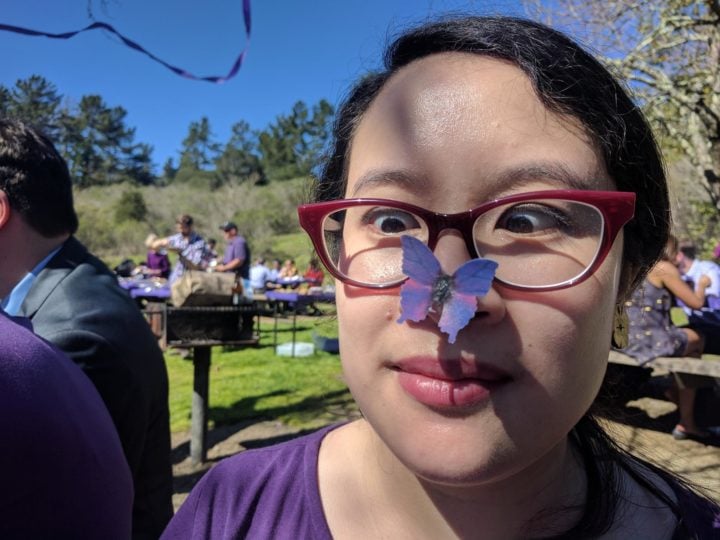
A consummate lover of books, tea, food and instant-speed kill spells, Michelle is a person of many passions. Her hobbies include cuddling cats, throwing pottery, and analyzing Magic lore from a literary perspective. She is also a co-host of the Vorthos comedy podcast, “The Loregoyfs,” and she comprises a full 25% of The Felidar Guardian (specifically the right hand, left ear and both scapulas). Her CMC is 2BWU, and her ETB trigger creates two 1/1 cats with lifelink and trample.

